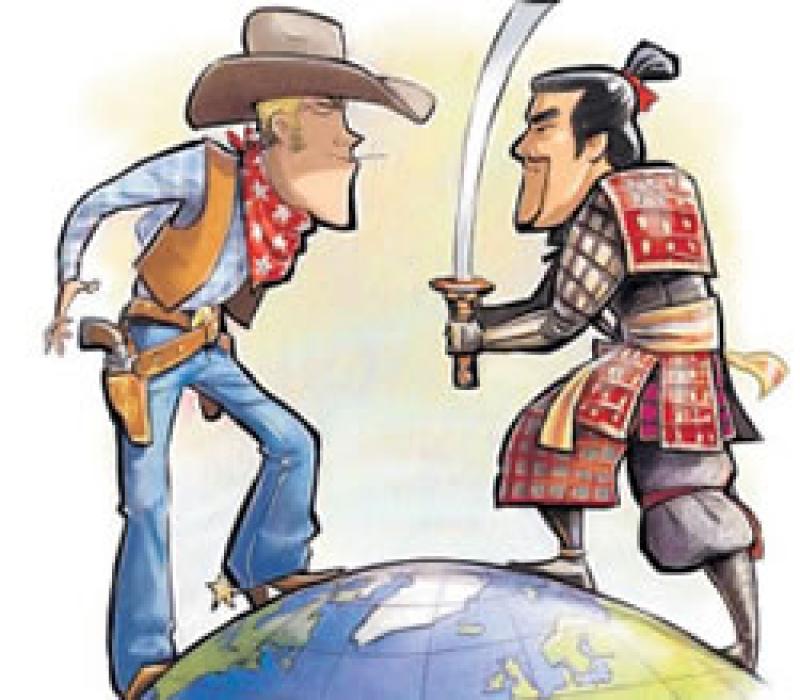Eastern Culture vs. Western Culture
By: No Author Indicated

Eastern Culture vs. Western Culture
What's the Difference?
Eastern culture and Western culture are two distinct and diverse ways of life. Eastern culture, predominantly found in countries like China, Japan, and India, emphasizes collectivism, harmony, and respect for authority. It places great importance on traditions, spirituality, and family values. On the other hand, Western culture, prevalent in countries like the United States, Canada, and most of Europe, values individualism, personal freedom, and innovation. It emphasizes the pursuit of personal goals, equality, and democratic principles. While Eastern culture tends to be more conservative and rooted in ancient customs, Western culture is often more progressive and open to change. Despite their differences, both cultures have contributed immensely to the global society and have their own unique strengths and weaknesses.
Comparison
| Attribute | Eastern Culture | Western Culture |
|---|---|---|
| Religion | Varies (Buddhism, Hinduism, Taoism, etc.) | Varies (Christianity, Judaism, Islam, etc.) |
| Individualism vs Collectivism | Collectivism | Individualism |
| Communication Style | Indirect, implicit | Direct, explicit |
| Family Structure | Extended family, strong emphasis on filial piety | Nuclear family, emphasis on independence |
| Education System | Emphasis on rote learning, respect for authority | Emphasis on critical thinking, individuality |
| Food | Rice, noodles, seafood, vegetables | Meat, potatoes, bread, dairy |
| Art and Aesthetics | Calligraphy, ink painting, tea ceremonies | Realism, perspective, individual expression |
| Time Orientation | Long-term, focus on history and tradition | Short-term, focus on progress and future |
| Gender Roles | Traditional, emphasis on harmony and hierarchy | Varies, emphasis on equality and individual rights |
| Social Etiquette | Politeness, respect for elders, saving face | Directness, individualism, personal space |
Further Detail
Introduction
Eastern culture and Western culture are two distinct and diverse ways of life that have evolved over centuries. These cultures have shaped the beliefs, values, traditions, and behaviors of people living in different parts of the world. While both cultures have their own unique attributes, it is important to understand and appreciate the differences between them. In this article, we will explore the various aspects of Eastern and Western cultures, including their perspectives on family, individualism, communication, religion, and education.
Family
In Eastern culture, family plays a central role and is considered the foundation of society. The concept of filial piety, or respect for one's parents and ancestors, is highly valued. Family members are expected to prioritize the needs of the family over their individual desires. Extended families often live together or in close proximity, fostering strong intergenerational bonds. In contrast, Western culture places a greater emphasis on individualism. While family is still important, individuals are encouraged to pursue their own goals and aspirations. Nuclear families are more common, and children are often encouraged to become independent at an early age.
Individualism vs. Collectivism
Eastern culture tends to be more collectivist, emphasizing the importance of the group over the individual. People in Eastern societies often prioritize harmony, cooperation, and consensus. They value conformity and maintaining social order. In Western culture, individualism is highly valued. Personal freedom, self-expression, and individual rights are emphasized. Western societies encourage individuals to pursue their own interests and goals, even if they differ from societal norms. This can lead to a greater emphasis on personal achievement and competition.
Communication
Communication styles also differ between Eastern and Western cultures. In Eastern culture, indirect communication is often preferred. People may use non-verbal cues, such as body language and facial expressions, to convey their thoughts and feelings. Respect for authority and hierarchy is important, and individuals may be more hesitant to express disagreement openly. In Western culture, direct communication is more common. People tend to be more explicit in expressing their opinions and feelings. Open debate and discussion are encouraged, and individuals are often expected to speak up and assert themselves.
Religion and Spirituality
Religion and spirituality play significant roles in both Eastern and Western cultures, but the dominant religions differ. Eastern cultures, such as those in Asia, are often influenced by religions like Buddhism, Hinduism, Confucianism, and Taoism. These religions emphasize concepts such as karma, reincarnation, and the pursuit of enlightenment. In Western cultures, Christianity has historically been the dominant religion, although there is now greater religious diversity. Western religions often focus on concepts such as salvation, sin, and the worship of a single deity. However, there is also a growing secular trend in Western societies, with an increasing number of people identifying as atheists or agnostics.
Education
The approach to education in Eastern and Western cultures also differs. In Eastern culture, there is often a strong emphasis on academic achievement and rote learning. Education is seen as a means to secure a successful future and bring honor to the family. Students are expected to respect and obey their teachers, and there is a focus on discipline and memorization. In Western culture, education is often viewed as a way to foster critical thinking, creativity, and individual growth. Students are encouraged to question and challenge ideas, and there is a greater emphasis on independent learning and problem-solving skills.
Conclusion
Eastern culture and Western culture are rich and diverse, each with its own set of values, beliefs, and traditions. Understanding and appreciating these differences can help foster greater cultural awareness and respect. While Eastern culture tends to prioritize collectivism, family, and indirect communication, Western culture emphasizes individualism, personal freedom, and direct communication. Both cultures have their own strengths and weaknesses, and by embracing the best of both, we can create a more inclusive and harmonious global society.
Comparisons may contain inaccurate information about people, places, or facts.
The administrator of this group reserves the right, along with the site moderators, to moderate all and any postings to this group, including the right to enforce the ToS, the CoC, and also including anything that the administrator deems within his sole discretion to be offensive, including and not limited to off topic or 'no value' comments, with the power to delete in exercising those rights.
It would be best, therefore, to be civil in posting on this group.
By now it should be well known that I am unable to open certain sources, videos and pictures. If I cannot, I will ask that they be described and explained. If the poster refuses to comply, their comment will be deleted. Instagrams are banned.







It didn't take me too long to learn the cultural and behavioural differences implicit in eastern society as contrasted with the western society in which I had grown up and spent most of my life. Quite a few times I have pointed out those differences. I have posted comments about the difference between eastern concern for the family and the group as compared to western preference for individual rights and personal freedoms, and about eastern cooperation as compared to western competition, even confrontation. I have seen the difference between sharing and monopolizing.
Native Americans, First Nations and the indigenous people of Central and South American are much closer to the Eastern culture than to the Western culture.
Good for you and your people. It must be quite a struggle there.